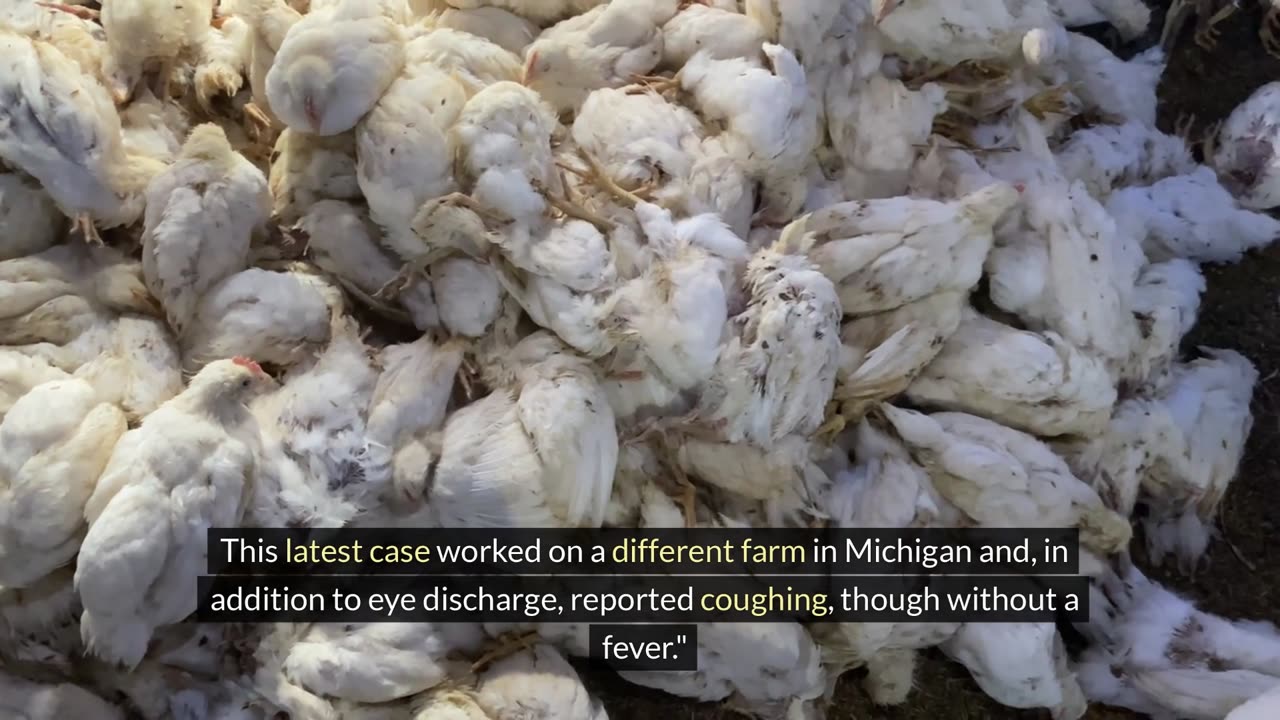Premium Only Content

"Bird Flu in the U.S.: a third personn been affected What You Need to Know"
*
"Hello everyone! Welcome back to our channel. Today, we're discussing a recent and concerning development in public health: a third person in the U.S. has tested positive for bird flu. Let's break down what this means and how it might impact you."
"A third dairy worker in the U.S. has tested positive for bird flu, which is currently causing outbreaks in cattle across at least nine states. This latest case involves a farmworker from Michigan who was exposed to infected cows."
"This worker is the first of the three confirmed cases to exhibit respiratory symptoms. The previous two individuals—another from Michigan and one from Texas—experienced discharge from the eyes but no respiratory issues."
"The latest patient reported both 'watery discharge' from the eyes and coughing, but notably, no fever. Tests conducted by Michigan's health department and confirmed by the CDC identified the strain as influenza A(H5), also known as avian influenza."
"CDC scientists are conducting additional studies to determine if the virus is changing. So far, there have been no spikes in flu cases among people in affected areas, nor unusual increases in ER visits or positive flu tests."
"Crucially, there have been no reports of the virus spreading from person to person within the households of the infected workers. The infected individuals and their families were monitored and offered antiviral medications."
"The CDC emphasizes that the outbreak in cows does not pose a significant health threat to the general public. However, those who work closely with sick animals should wear protective equipment and report any flu-like symptoms to their local health department."
"In the first Michigan case, the worker was directly exposed to contaminated milk that splashed in his eye, and he wasn't wearing protective gear. In the latest case, the worker wasn't wearing a mask while working with a sick animal."
"Dr. Natasha Bagdasarian, chief medical executive at the Michigan Department of Health and Human Services, points out that direct, sustained exposure to sick animals without proper protection increases the risk of infection."
"While the risk to the general public remains very low, there are steps everyone can take to stay safe. The CDC advises avoiding raw milk, which has not been pasteurized. Pasteurization temperatures generally inactivate the virus, making pasteurized milk safe to drink."
"Thanks for tuning in! Stay informed and take precautions. If you found this video helpful, please share it with others, like, comment, and subscribe to our Rumble channel for more updates on important health topics. Together, we can stay safe and healthy."
-
 LIVE
LIVE
The Charlie Kirk Show
39 minutes ago"Playing Dead" Democrats + The Epstein Misfire + Charlie vs. Newsom | Schimel, Marlow, Baller | 2.28
6,259 watching -
 55:05
55:05
The Dan Bongino Show
3 hours agoAmerica Is Back In The World Stage, And We Love To See It (Ep. 2433) - 02/28/2025
220K715 -
 49:29
49:29
The Rubin Report
2 hours agoDetails About Joy Reid’s Weeping Farewell No One Noticed with Co-Host Megyn Kelly
9.74K16 -
 LIVE
LIVE
Benny Johnson
1 hour ago🚨Epstein Files COVERUP EXPOSED: FBI Sabotaging Trump, DELETING Evidence?! | Tapes 'MISSING'?!
15,617 watching -
 59:29
59:29
Steven Crowder
3 hours agoCrafting Crowder's Comedy Gold | Behind the Scenes
137K85 -
 2:06:44
2:06:44
Tim Pool
2 hours agoTHE END OF THE WEST, Will We Survive Without Christianity? | The Culture War with Tim Pool
56.8K33 -
 LIVE
LIVE
Right Side Broadcasting Network
3 hours agoLIVE: President Trump and Ukrainian President Zelenskyy Meet and Hold a Press Briefing - 2/28/25
5,785 watching -
 LIVE
LIVE
LFA TV
15 hours agoBODYCAM FOOTAGE OF TRAFFIC STOP! | LIVE FROM AMERICA 2.28.25 11AM
4,725 watching -
 LIVE
LIVE
The Big Mig™
4 hours agoGlobal Finance Forum From Bullion To Borders We Cover It All
2,057 watching -

Tudor Dixon
2 hours agoThe Last Supper with Chris Tomlin | The Tudor Dixon Podcast
95